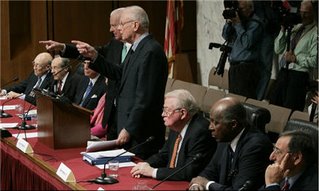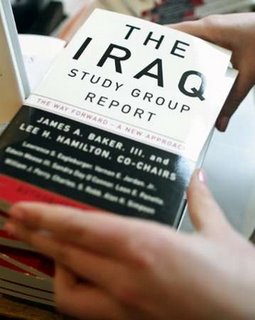 Yesterday, members of the Iraq Study Group (ISG) delivered their 79 (change-the-course)recommendations – like a Christmas gift – to President Bush at a White House breakfast meeting, and to the American people at a Capitol Hill news conference.
Yesterday, members of the Iraq Study Group (ISG) delivered their 79 (change-the-course)recommendations – like a Christmas gift – to President Bush at a White House breakfast meeting, and to the American people at a Capitol Hill news conference.
(Incidentally, unless the number “79” has some numerological power that will make their recommendations more enforceable, I wonder why the ISG did not condense them by 4 to 75, or increase them by 1 to 80 to make them more palatable.)
At any rate, although wrapped in a hypothetical quagmire, the recommendations purportedly offer a “last chance” to rescue U.S. troops from the killing fields of Iraq and salvage what’s left of America’s international pride and gravitas.
Only in Washington, however, could stale ideas be repackaged and presented as new with such ceremonial authority. But frankly, re-gifting last year’s fruitcake has more integrity than the gift the ISG presented yesterday.
In fact, notwithstanding his gracious acceptance of the bound volume of these recommendations, Bush has already indicated (before and after accepting them) that all of the ones with any merit have already been incorporated into his “policy adjustment” now well-underway.
But, for the record, here are some of the Iraq truism the ISG proffered that are worth reinforcing:
– Our ship of state has hit rough waters, It is time to chart a new course.
– We agree with President Bush’s stated goal of an Iraq that can govern itself, defend itself, and sustain itself
– The situation in Iraq is grave and deteriorating…. We’ve traded one nightmare for another.
– Iraq’s neighbors and key states in and outside the region should form a support group to reinforce security and national reconciliation within Iraq, neither of which Iraq can achieve on its own.
 – Iran appears content for the U.S. military to be tied down in Iraq, a position that limits U.S. options in addressing Iran’s nuclear program and allows Iran leverage over stability in Iraq.
– Iran appears content for the U.S. military to be tied down in Iraq, a position that limits U.S. options in addressing Iran’s nuclear program and allows Iran leverage over stability in Iraq.
– [T]he Syrians look the other way as arms and foreign fighters flow across their border into Iraq, and former Baathist leaders find a safe haven within Syria.
– By the first quarter of 2008, subject to unexpected developments in the security situation on the ground, all combat brigades not necessary for force protection could be out of Iraq.
– Iraq is a major test of, and strain on, U.S. military, diplomatic, and financial capacities. Perceived failure there could diminish America’s credibility and influence in a region that is the center of the Islamic world and vital to the world’s energy supply.
– If the situation continues to deteriorate, the consequences could be severe. A slide toward chaos could trigger the collapse of Iraq’s government and a humanitarian catastrophe. The global standing of the United States could be diminished. Americans could become more polarized.
Significantly, the ISG did not recommend the only strategy that could accomplish the stated goal it shares with President Bush; viz: a dramatic increase in the number of troops consistent with the Powell Doctrine (and the Pottery Barn “you break it, you own it” principle). However, this is not because the ISG considered the doctrine and found it wanting. Rather, it’s because, despite recognizing it as the course the U.S. should have taken, the ISG lamented the fact that the U.S. military simply does not have enough manpower to execute the Powell Doctrine. (See Related Articles).
Yet it is undeniable that unless U.S. forces can impose conditions on the ground that are tantamount to martial law (think Japan after WWII), none of these recommendations will have any impact on the civil war now raging in Iraq, and all of the doomsday scenarios the ISG rightly expresses grave concerns about will materialize.
After all, it’s as clear to me as yesterday’s news that, no matter how much training and embedding they’re offered, the Iraqis will not stand up to govern, defend and sustain itself. Therefore, having now broken Iraq, the U.S. must either assume total responsibility for fixing it, or cut and run and let the chips fall where they may! All else is political folly….
Meanwhile, as the ISG was presenting its blueprint for a way out yesterday, 10 more US soldiers were blown to smithereens in the killing fields of Iraq….
NOTE: Many political analysts lauded as a bold new strategy the ISG’s recommendation that the U.S. should hold direct talks with Iran and Syria over the fate of Iraq. However, Bush has made it patently clear that he believes Iran and Syria have been fomenting and funding the Iraqi conflict and have the blood of American soldiers on their hands.
Never mind that the only reason these countries (especially Iran) would want to have talks with the U.S. would be to negotiate the terms of U.S. surrender and withdrawal from Iraq.
Therefore, Bush is no more inclined to sit down and negotiate with them than he is to do so with North Korea. Nonetheless, he has conceded that the Iraqis are free to hold such talks on their own behalf if they deem them worthwhile. And, in fact, Iraqi leaders are already bartering with Iran and Syria; which, alas, makes American soldiers seem more like Filipino-guest workers than masters of Iraq’s fate….
Related Articles:
No justice at home, no peace in Iraq unless the U.S. reinstates the Draft!
Iraq Study Group
Leave a Reply
You must be logged in to post a comment.